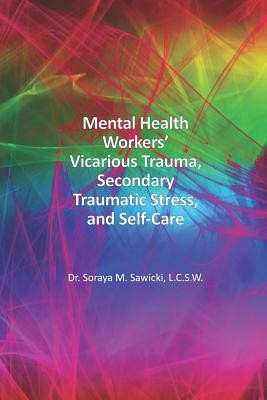
- Išsiųsime per 10–14 d.d.
- Autorius: Soraya M Sawicki Lcsw
- Leidėjas: Dbc Publishing
- ISBN-10: 1948149109
- ISBN-13: 9781948149105
- Formatas: 15.2 x 22.9 x 1.7 cm, minkšti viršeliai
- Kalba: Anglų
- Extra -15 % nuolaida šiai knygai su kodu: ENG15
Mental Health Workers' Vicarious Trauma, Secondary Traumatic Stress, and Self-Care + nemokamas atvežimas! | knygos.lt
Atsiliepimai
Aprašymas
This is a 'must-buy book' for mental-health workers, licensed social workers, licensed professional counselors, and licensed marriage and family therapists, as well as first responders and their supervising managers, and/or the organizations for who these helpers work. This research study focuses on keeping the helping work-force professionals mentally and emotionally stable after encountering second-hand trauma from their clients or patients. This research identifies Secondary Traumatic Stress - or Vicarious Trauma - and illustrates real-life examples and recommends self-care options.First responders, social workers, and mental-health professionals encounter experiences directly or indirectly through helping others in emergencies following trauma care, and/or mental health care treatments. While these workers help others, they may also experience vicarious trauma or they may 're-experience' past traumas of their own re-lived via their patients or clients. Mental health professionals Vicarious Trauma experiences may directly and adversely affect services provided to their own patients and clients.
This qualitative research study provides insight into the minds of social workers who treat patients with trauma, post-traumatic stress disorder (PTSD), or other high-stress emotional, physical, abuse, traumatic, and/or mental conditions. Social workers may be affected vicariously via VT/STS - through daily services to patients or clients as mental health professionals. Readers of this book can feel and understand the vicarious trauma stories from lived experiences of social workers and helpers who work with these patients and may vicariously experience or re-experience trauma from their own lives.
This research acknowledges the presence of VT/STS. The researcher also identifies care of symptoms presented by mental-health workers, licensed social workers, licensed professional counselors, and licensed marriage and family therapists who are exposed to and may suffer VT/STS from their clients. This study documents how some social workers treat their own mental, emotional, and physical VT symptoms with 'self-care, ' as well as how their supervisors can acknowledge and provide support directly to the mental health professionals to reduce or alleviate VT/STS.
The participants in the study provided insight on how they provided or created their own 'self-care' treatments. The researcher also provided recommendations for organizations to be aware of VT/STS in their mental health workers and what steps organizations can take to reduce or make available options to their workers to reduce both emotional and physical VT/STS symptoms.
EXTRA 15 % nuolaida su kodu: ENG15
Akcija baigiasi už 10:10:38
Nuolaidos kodas galioja perkant nuo 10 €. Nuolaidos nesumuojamos.

- Autorius: Soraya M Sawicki Lcsw
- Leidėjas: Dbc Publishing
- ISBN-10: 1948149109
- ISBN-13: 9781948149105
- Formatas: 15.2 x 22.9 x 1.7 cm, minkšti viršeliai
- Kalba: Anglų
First responders, social workers, and mental-health professionals encounter experiences directly or indirectly through helping others in emergencies following trauma care, and/or mental health care treatments. While these workers help others, they may also experience vicarious trauma or they may 're-experience' past traumas of their own re-lived via their patients or clients. Mental health professionals Vicarious Trauma experiences may directly and adversely affect services provided to their own patients and clients.
This qualitative research study provides insight into the minds of social workers who treat patients with trauma, post-traumatic stress disorder (PTSD), or other high-stress emotional, physical, abuse, traumatic, and/or mental conditions. Social workers may be affected vicariously via VT/STS - through daily services to patients or clients as mental health professionals. Readers of this book can feel and understand the vicarious trauma stories from lived experiences of social workers and helpers who work with these patients and may vicariously experience or re-experience trauma from their own lives.
This research acknowledges the presence of VT/STS. The researcher also identifies care of symptoms presented by mental-health workers, licensed social workers, licensed professional counselors, and licensed marriage and family therapists who are exposed to and may suffer VT/STS from their clients. This study documents how some social workers treat their own mental, emotional, and physical VT symptoms with 'self-care, ' as well as how their supervisors can acknowledge and provide support directly to the mental health professionals to reduce or alleviate VT/STS.
The participants in the study provided insight on how they provided or created their own 'self-care' treatments. The researcher also provided recommendations for organizations to be aware of VT/STS in their mental health workers and what steps organizations can take to reduce or make available options to their workers to reduce both emotional and physical VT/STS symptoms.




Atsiliepimai